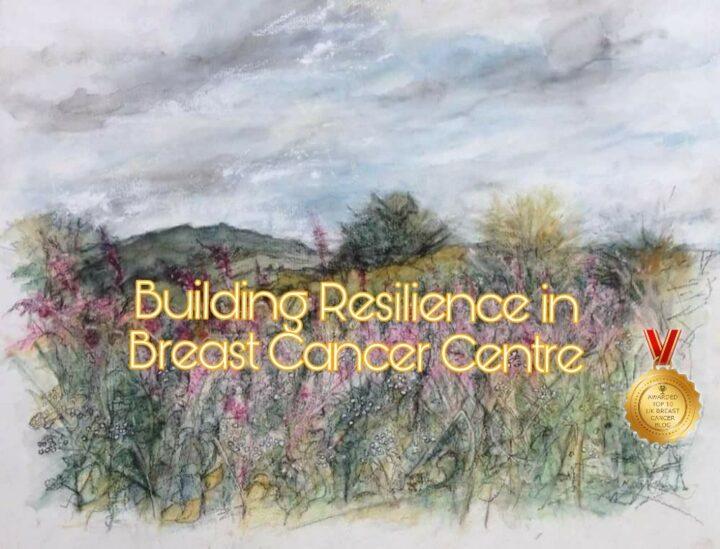For World Cancer Day 2023, Professor Nazanin Derakhshan, founder of the award-winning Centre for Building Resilience in Breast Cancer (BRiC), reflects on Closing the Care Gap when it comes to mental health support for people diagnosed with cancer.

It is estimated that by 2040, there will be 27.5 million new cancer cases each year worldwide. While there is variation in survival rates according to cancer type, more people will survive cancer thanks to ongoing medical advances in treatments.
Every two minutes a person is diagnosed with cancer in the UK. However, cancer survival has doubled in the last 40 years. In 2020, there were 2.5 million people living with cancer and this figure is estimated to reach 4 million by the year 2030.
For some of the more common cancers such as breast and skin cancer it is estimated that over 85% will survive at least five years post-diagnosis and around 70% for more than 10 years. These figures raise much hope and suggest that the cancer care gap – at least for survival – is becoming smaller.
The figures on the mental wellbeing of cancer survivors present a stark contrast and suggest that the psychological health of individuals with cancer needs immediate attention. A recent study found that in England, there was a 20% increased risk of suicide in cancer patients compared to the general population.
The ramifications of cancer for mental health are eye-opening: from negative effects on social and family lives to impaired ability to work. Research shows an increased long-term vulnerability to anxiety and major depression in around 20% of cancer patients which is linked with poorer adherence to treatment, poorer survival outcomes and an increased risk of suicide. Over 70% of cancer patients do not receive effective psychiatric treatment.
The economic burden of cancer in the UK alone is around £7.6 billion annually. Over 50% of people diagnosed with cancer are forced to make changes to their working patterns and receive less income. 75% of cancer survivors report the negative effects of cancer on their family and social lives, an effect that is more pronounced in women.
These figures call for an urgent collective attempt to develop new mental health support strategies for cancer survivors.
“I feel like I have been given a chance to survive but not to live” – Vickie
Women with a diagnosis of breast cancer are a sensitive population who experience a lower quality of life compared to other female cancer survivors. They can experience considerable shortcomings in attention and memory adversely affecting daily activities, self-confidence, and workability, as well as experiencing an increased predisposition to anxiety and depression, and suffering from fatigue, sleep disorders and pain, longer term.
Breast cancer is the biggest cause of malignancy in women worldwide and, in the UK alone, a woman is diagnosed with breast cancer every 10 minutes. Recent statistics show that around 70% of women with early stage diagnosis can live beyond 10 years, with mortality rates projected to fall by 26% by 2035.
At the same time, research reports that anxiety and depression can increase the risk of mortality by up to 30% in women with a breast cancer diagnosis. To make matters worse, an increased risk of suicide in this population shows that 1 in 10 women have suicidal ideations one year after surgery for breast cancer with the risk of suicide higher than that of the general population.
Our psychological and physical health work in tandem and interact to produce what we call ‘quality of life’. Individuals diagnosed with cancer need and deserve the psychological support to build resilience and adapt better to the challenges facing them after diagnosis. Not only will they benefit, but the NHS and the UK economy will save billions of pounds in the longer term.
To support women with a breast cancer diagnosis, the Centre for Building Resilience (BRiC) which I founded a few years ago, conducts cutting-edge research into better interventions that can empower women with the right tools in their ongoing challenges.
BRiC’s translational network has currently over 2,100 members with a primary or a secondary diagnosis of breast cancer, who are led by seven admins and myself. Our collective voice highlights the emotional impact of breast cancer on our mental and physical health. As a community we have joined forces and believe that we are here to thrive and not just survive. The journey may not be smooth but together we are stronger.
Nazanin Derakhshan is a professor of Experimental Psychopathology in the School of Psychology and Clinical Language Sciences at the University of Reading and founder of the BRiC Centre. Learn more about BRiC by visting:
- The website: https://briccentre.co.uk/
- Panning for Gold, BRiC’s Collective Voice: https://bcresiliencecentre.blogspot.com/
- Twitter: @ProfNDerakshanor @BC_Resilience
- Facebook: com/resilienceinbreastcancer
- Instagram @briccentre
